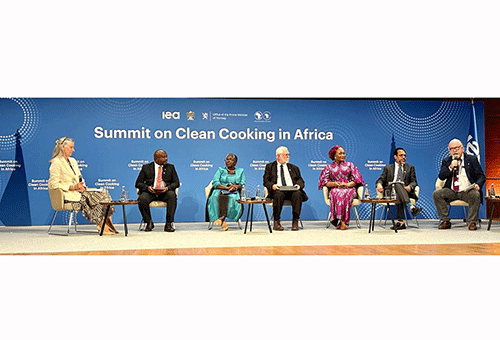A lack of financial capacity in both public and private sectors has impeded Namibia and other African countries from achieving clean cooking goals. Moreover, a need exists for partnerships with industrialised countries, multinational companies and the global private sector to finance measures needed to bring about meaningful mitigation for clean cooking.
These sentiments were shared in Paris on Tuesday by agriculture, water and land reform minister Calle Schlettwein during a Summit for Clean Cooking in Africa organised by the International Energy Agency (IEA).
The components necessary for clean cooking are, clean energy, clean water, clean food, clean utensils and clean shelter, with hygienic and clean sanitation systems.
“Financing clean cooking is much more than financing an energy transition. It must include financing water infrastructure, sanitation systems and smart sheltering. It is an important component of financing poverty eradication. Many technologies are already available to combine and enhance clean living, which include energy smart houses, smart water uses and converting sewage and wastewater into reusable resources, but are they affordable to all?” Schlettwein questioned at the summit.
He added that clean cooking is an important matter, which brings forward the complexities of the global developmental agenda, the environmental agenda, the global health agenda, the gender agenda, the energy transformation agenda, the water agenda, the agriculture and food sustainability agenda, and the need to review financial systems to household levels. As such, the minister noted that families and communities must financially have the capacity to live clean, to cook clean and utilise resources sustainably. Inclusive strategies, which address poverty and enhance sustainability in resource utilisation, must be the priority.
Said Schlettwein: “While we agree that reaching clean cooking by 2030 is a realistic target, we need to remind you that African economies are more often than not overburdened by debt, with resultant lack of fiscal space. Funding models that assume more borrowing to solve the clean cooking crisis, therefore, would not offer a viable financing option for African economies. The current multilateral financial system appears unfit for purpose, and its review should become part of the clean cooking agenda as well as the climate change agenda as a whole. A viable financing model must deliver clean cooking and services to households for free since poor families have no ability to pay back loans”.
Noting that Namibia welcomes the “Clean Cooking” agenda in the environmental, developmental, financial and energy transformation agenda, Schlettwein stated the country desires to become a regional energy hub in southern Africa by sustainably utilising its available energy resources.
The minister pointed out recent discoveries of significant oil and gas resources that could potentially make Namibia the third-largest African oil producer. At the same time, the country is at the forefront of developing a green hydrogen
industry by exploiting solar and wind resources, considered some of the best globally.
“Namibia’s economic and environmental fortunes and future are therefore to a large extent dependent on how these resources are leveraged to bring about sustainable development, long-lasting economic growth and wealth-creation, while at the same time, our contribution to a meaningful energy transition is enhanced,” said Schlettwein.
He added that clean cooking, however, cannot be approached through exclusively looking at the energy agenda. For this, a much broader; more diverse and integrated approach is needed.
“Over and above clean energy at affordable rates, the need to address the current water crisis and stabilise the freshwater cycle is a pressing
reality. An improved capacity to deliver clean water and hygienic sanitation, again at an affordable cost to humans, industry and the environment, is necessary for development. Equally, agricultural production must be cleaned up so that the food and fibre produced are indeed clean and affordable for all, and environmentally-sustainable. A further prerequisite will be clean and safe housing, also at affordable cost,” said
Schlettwein.



